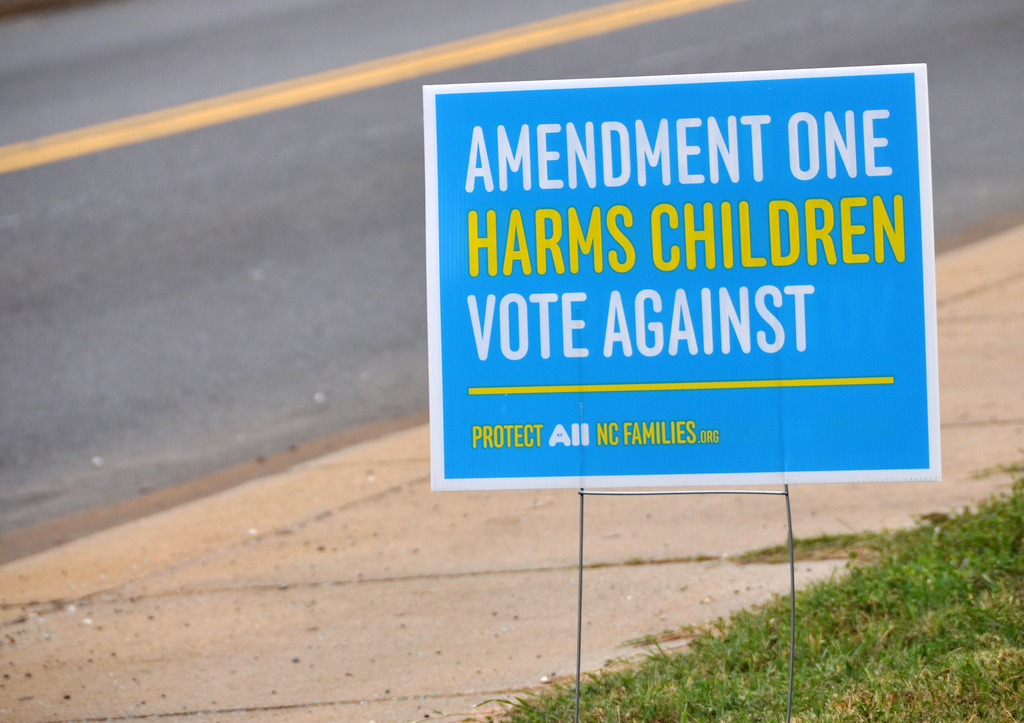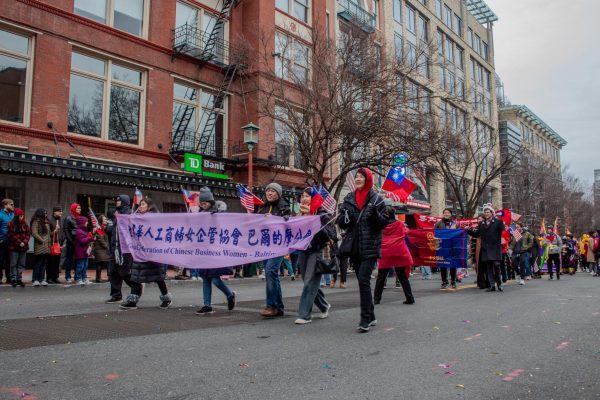Voter ignorance, Christianity, and North Carolina
Maybe I’ve been living in the AU bubble too long. In the past week alone, we’ve had our own amazing and beautiful former student government president come out as transgendered – and even though there were sure to be few words of disrespect, the overwhelming reaction was supportive and loving. I looked upon Sarah’s announcement with pride and admiration.
However, AU is nowhere near representative of the typical American voter. Or the typical American, for that matter.
My home state of North Carolina has been getting a lot of national press for its controversial Amendment One: a bill that states “marriage between one man and one woman is the only domestic legal union that shall be valid or recognized.” It is now the 30th state to adopt such legislation, which effectively shuts the door on gay marriage, domestic partnerships, and civil unions. This amendment has been criticized by Governor Bev Perdue, Senator Kay Hagan, former Charlotte mayors Harvey Gantt (Democrat) and Richard Vinroot (Republican), the Chair of the NC Libertarian Party J.J. Summerell, even President Bill Clinton, among so many others, for being vague, poorly constructed, and having a wide range of unintended consequences. Amendment One takes away the rights of unmarried women in cases of domestic violence and stalking cases. People can lose legal custody of their children.
Sounds pretty messed up, right? Fun fact: you can marry your cousin in North Carolina… just not your gay cousin.
So when thousands took up to the streets, flooded Facebook, and shared their stories of how the Amendment would directly harm their and their neighbor’s lives in protest, I felt North Carolina taking a great step forward in the fight for human rights. Everyone seemed to be talking about “voting against.” A huge wave of youth optimism rose up and I felt faith and confidence that my state would continue on its slowly but increasingly progressive path. That is, until about 10pm May 8th when it was formally announced that the bill had passed.
This made no sense to me. Absolutely none. There were infographics on how the bill would affect even straight couples! How can people dispute infographics?! The facts are literally drawn out for you.
But then I looked at which counties had voted which way, and sure enough, the metropolitan areas of Raleigh, Charlotte, and Greensboro (as well as some university-bearing counties in the mountains) has voted against – and the rest of North Carolina voted for it.
Some church leaders, Reverends, and religious community members spoke out against Amendment One very openly. “Vote against discrimination, vote against hate,” says Reverend William Barber, the head of North Carolina’s NAACP. Many embraced the sentiment that Christianity is based on the ideals of loving thy neighbor and encouraged other Christians in their community to vote against. Or, at the very least, acknowledge that this amendment clearly violates the separation of church and state.
But then, there is the other side of the spectrum: those who are aggressive, angry, and appalled to see gay marriage even be a debate-worthy topic. The highly influential Reverend Billy Graham of the Charlotte-based Billy Graham Evangelistic Association and a man who has openly stated he “doesn’t recommend interracial marriage” said in a statement, “At 93, I never thought we would have to debate the definition of marriage … The Bible is clear — God’s definition of marriage is between a man and a woman. I want to urge my fellow North Carolinians to vote for the marriage amendment … Watching the moral decline of our country causes me great concern. I believe the home and marriage is the foundation of our society and must be protected.”
It is even more deeply disturbing to realize the advocates for this bill are people like Pastor Sean Harris of Berean Baptist Church in Fayetteville, who openly encourages fathers to “beat the gay” out of their sons. “Can I make it any clearer? Dads, the second you see your son dropping the limp wrist, you walk over there and crack that wrist. Man up. Give him a good punch. Ok? ‘You are not going to act like that. You were made by God to be a male and you are going to be a male.’”
But surely those are just the extremists? Sadly, no: in an exit poll, Joe Easterling of Wake Forest declared, “I know that some people may argue that the Bible may not necessarily be applicable, or it should not be applicable, on such policy matters. But even looking at nature itself, procreation is impossible without a man and a woman. And because of those things, I think it is important that the state of North Carolina’s laws are compatible with the laws of nature but, more importantly, with the laws of God.”
That’s the typical North Carolinian voter, at least according to the passage of this amendment. And yet still, how is this not offset by the outcry of well-informed, passionate voters?
According to Public Policy Polling, there was “widespread voter confusion about what North Carolina’s Amendment 1 seeks to accomplish. Just 36 percent of voters answered correctly that it bans both same-sex marriage and domestic partnerships. An additional 26 percent thought it banned same-sex marriage alone. Meanwhile, 10 percent of voters thought a “yes” vote on the amendment would legalize rather than ban same-sex marriage, and 27 percent weren’t sure what it did.”
So what does this all mean? It all reminds me of the fascinating idea behind voter ignorance, or as Charles Rowley and Friedrich Schneider call it, rational ignorance, wherein voters choose “comforting beliefs” as opposed to accepting new and factual information which might challenge their beliefs. In essence, if a voter is presented with the facts, and those facts fundamentally contradict their most steadfast beliefs, they not only reject the facts and choose not to seek more but also hold more strongly to their preconceived notions.
I do not know what percent of voters who supported the bill were Christians (though it can be assumed a pretty high amount since 79% of North Carolinians are Christians), but according to this argument, the fundamentally irrational voters could have been presented with all the information about how this amendment will affect marriage and unions, families, children, women, and straight and homosexuals alike, but because it contradicts their core beliefs about homosexuality and religion, they chose to reject the facts and vote for Amendment One. Furthermore, because their religious leaders are the most outspoken, they will accept this extremism as rational thought instead of the information their leaders condemn.
This could be a debate about the separation of church and state, but I gave up on that rational thinking a long time ago. Instead, I present an argument that the majority of North Carolinian voters choose rather to live in comfortable ignorance than a discordant truth.
It should not surprise me that this is the case. In so many ways, this is the political culture I have passively accepted. I’m so proud of the efforts of my friends and family members who made this election the highest voter participation since before the 2008 Presidential election. I haven’t entirely abandoned hope that the amendment will be repealed within the coming months, and this will be just another sad hiccup in the grander scheme of equal rights.
But until then, I hang my head in shame of my home state, of the hateful and powerful influence of extreme religious leaders, and of voters who would rather nod along to their comfortable status quo than accept the facts that Amendment One will ruin the lives of so many of their fellow North Carolinians.
Photo by Willamor Media via Creative Commons License.












